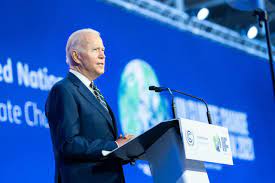At its June 6 board meeting, the U.S. International Development Finance Corporation (DFC) is likely to consider a $500 million guarantee for Goldman Sachs to help Polish oil and gas company PKN Orlen increase its imports of U.S. LNG.
This would violate Biden’s commitment to end international public finance for fossil fuels by the end of 2022, which he made at the 2021 UN COP26 climate summit in Glasgow and later reiterated at the G7.
Finance for LNG contradicts climate science and is financially risky, in addition to exacerbating environmental injustice.
This comes weeks after the first known violation of this pledge, U.S. Export-Import Bank approving almost USD 100 million for the controversial Balikpapan oil refinery in Indonesia.

WASHINGTON, DC — U.S. President Joe Biden is at risk of breaking a major climate promise to end international public finance for fossil fuels, with the U.S. International Development Finance Corporation (DFC) considering a USD 500 million guarantee to support the import of U.S. LNG in Poland. The transaction could be approved as early as DFC’s board meeting next week on June 6.
Just last month, the U.S. Export-Import Bank approved almost USD 100 million for the controversial Balikpapan oil refinery in Indonesia, the first known violation of Biden’s promise to end public finance for international fossil fuel projects by the end of 2022. While most of its peers — including Canada, the United Kingdom, and France — have published policies to uphold this commitment, the United States has refused to make its policy public.
Adding to this lack of transparency, the pending finance transaction was initially posted on DFC’s pending project list on May 23 [1]; as of May 30, it had been removed. The “public information summary” remains live, and DFC could still approve the transaction as soon as its upcoming board meeting next week.
In response to the proposed transaction, Collin Rees, United States Program Manager at Oil Change International, said:
“President Biden has cited his promise to end international public funding for fossil fuels as a sign of his ongoing commitment to climate leadership, even as he boosts fossil fuels and breaks many of his core climate promises at home. The Development Finance Corporation approving this dirty project would show once and for all these claims are nothing but empty words.
“Biden’s refusal to publish public guidance upholding the international fossil fuel pledge is enabling DFC to keep funding dirty fossil fuel expansion. In removing this massive handout to the U.S. LNG industry from its pending project list, DFC is following Biden’s lead and keeping ongoing fossil fuel support hidden from the public eye.
“If approved, this $500 million climate-wrecking handout would further threaten the air, land, and water of frontline communities in the United States and in Poland, making a mockery of Biden’s purported commitment to environmental justice. It would also prolong Europe’s fossil-fueled energy crisis. A rapid buildout of 100% renewable energy is the only pathway to global energy security.”
###
[1] A May 25 screenshot shows the PKN Orlen proposal was listed on DFC’s pending project list (where it first appeared on May 23), but it had been removed as of May 30. This removal does not prevent the DFC Board from approving the transaction at their June 7 meeting, but does add barriers to public scrutiny.
Notes
The Glasgow Statement was launched at the 26th Conference of the Parties to the United Nations Framework Convention on Climate Change (COP26) in Glasgow, Scotland. The 39 signatories aim to “end new direct public support for the international unabated fossil fuel energy sector by the end of 2022” and instead “prioritise our support fully towards the clean energy transition”. It was signed by 34 governments and five public finance institutions.
Recent research by Oil Change International shows that while many countries are living up to their Glasgow commitment, a small number of countries, including the United States, are lagging behind.
In October 2022, the International Energy Agency published its authoritative World Energy Outlook, showing oil, gas, and coal demand plateauing this decade, and confirming that no new oil and gas investment can be permitted if the world is to keep to global warming below the Paris Agreement’s 1.5ºC goal.